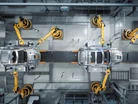Ford warns long-awaited EV labour concerns could be true

The automotive industry is undergoing a shift from the conventional mechanical engineering practices required for fossil-fuel-powered vehicles to a technology-driven innovation effort.
As electric vehicles (EVs) rise up in significance, more emphasis is placed on the technology behind the wheel, as opposed to the engine in front of it.
Over the years, there have been concerns around employment in the industry and what will happen to individuals with outdated skills, but also the rather large percentage of employees that may be removed from the vehicle production line due to lack of jobs.
EV employment concerns are not new
The electrification regime will take a significant level of change to deploy and automotive manufacturers will need to look to the future to figure out where their employees will be best placed.
Workers have already expressed their concerns and, looking specifically at the strikes against General Motors (GM) in 2019, which highlighted the disgruntlement of employees about the reduced labour demand of EVs. This is due to the fact that battery-electric vehicle (BEV) manufacturing can be heavily automated, reducing the need for physical human input.
While hybrid-electric vehicles (HEVs) would keep workers happy with the level of personnel required, the main focus for automakers is shifting the sector towards BEVs to reap the benefits of complete decarbonisation.
The CEO of Ford Motor Group, Jim Farley recently spoke on the topic, agreeing that work must be done to ensure employees have jobs in the future. According to Farley, electrification will result in a reduction of labour demand by around 40% as much of the production line will be automated, leaving fewer intricate tasks for employees to carry out.
While this process creates consistent products every time, the workforce will require opportunities to upskill and work in various other facets of the business or industry. Farley believes that in-housing other components of the production line is a critical step to provide an adequate number of jobs.
“It takes 40% less labour to make an electric car, so…we have to in-source, so that everyone has a role in this growth,” Farley told the Financial Times.
“We have a whole new supply chain to roll out, in batteries and motors, and electronics, and diversity has to play an even greater role in that.”
The EV industry must become more diverse
In some parts of the world, this reduction in opportunities may not be the case. Thanks to studies conducted by Ciel HR on the Latest Employment Trends in EV Sector 2022, it looks like India’s EV industry has seen positive growth in employment numbers.
With a total sample size of 15,700 employees, the report shows a 108% growth over a two-year period, which is 73% higher in the second year. This is expected to be a result of India’s government and the incentives provided to get the EV industry off the ground across the nation.
One of the major investment opportunities that facilitated this was the backing from the government's FAME scheme, which resulted in a INR5.64bn (£58mn) incentive for growth.

